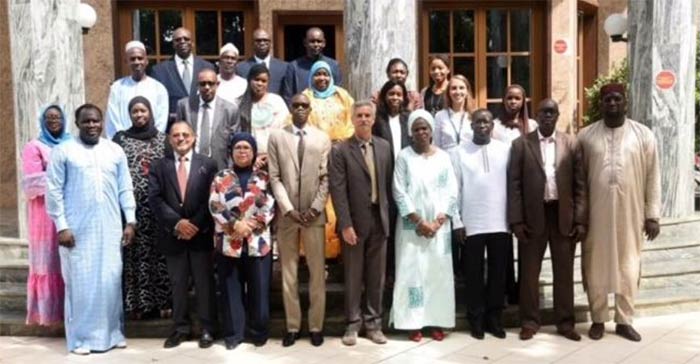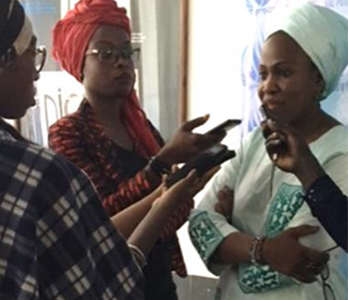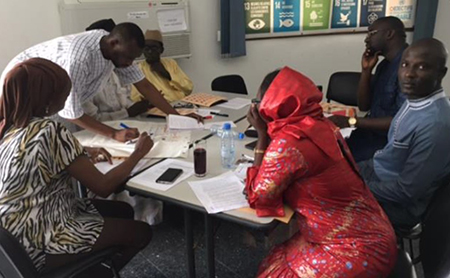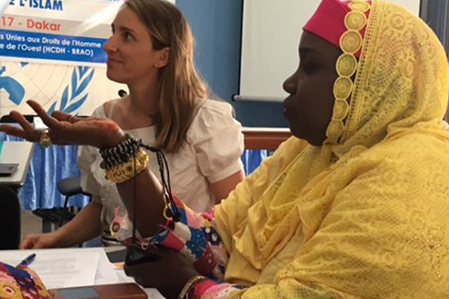Symposium for religious leaders and civil society
Date
03 - 04 May 2017
LOCATION
Dakar, Senegal

From 3 to 4 May 2017, OHCHR Regional Office for West Africa organized with the Senegalese Ministry of Foreign Affairs and the Ministry of Justice a symposium for religious leaders and civil society representatives on the rights of women and children from the perspective of Islam and in the context of the Beirut Declaration and its 18 commitments on “Faith for Rights”.
Objectives of the Dakar symposium
The symposium in Dakar, which received important media attention, served as a first test of the 18 commitments. It gathered a number of preachers, lawyers, judges and parliamentarians from the Senegalese society and was enriched by high level panellists from Senegal, Egypt and Tunisia, including the former UN Special Rapporteur on extrajudicial, summary or arbitrary executions, the Senegalese member of the UN Committee on Migrant Workers and the UN Special Rapporteur on minority issues, as well as renowned Islam and human rights specialists.
The objective of the symposium was to place human rights and Islam in the more global context of the Beirut Declaration of 29 March 2017, and to see how the 18 commitments from religious leaders and civil society representatives could be adapted and turned into concrete projects in Senegal. OHCHR Regional Office for West Africa invited the participants to address in particular the rights of women and children (using as a basis CEDAW and CRC recommendations regarding Senegal in 2015 and 2016 respectively) with a purpose to deconstruct the misunderstandings on Islam that some religious leaders and believers in Senegal and others around the world continue to convey.
Outcomes in the Senegalese context
 Participants who were divided into working groups during the second day of the symposium all agreed that only the following Commitments could raise tensions and lead to human rights violations in Senegal:
Participants who were divided into working groups during the second day of the symposium all agreed that only the following Commitments could raise tensions and lead to human rights violations in Senegal:
- Commitment 5 (non-discrimination and gender equality),
- Commitment 10 (not to give credence to exclusionary interpretations claiming religious grounds),
- Commitment 12 (refine the curriculums, teaching materials and textbooks),
- Commitment 13 (engaging with children and youth, who are either victims of or vulnerable to incitement to violence in the name of religion),
- Commitment 16 (leverage the spiritual and moral weight of religions and beliefs with the aim of strengthening the protection of universal human rights and developing preventative strategies that we adapt to our local contexts, benefitting from the potential support of relevant United Nations entities),
- Commitment 17 (implementation through exchange of practices) and
- Commitment 18 (use technological means more creatively and consistently in order to disseminate this declaration and subsequent Faith for Rights messages).
 On the above commitments, participants considered that the Government of Senegal has the primary obligation in this regard. Concrete projects were then discussed in order to intensify governmental and civil society efforts.
On the above commitments, participants considered that the Government of Senegal has the primary obligation in this regard. Concrete projects were then discussed in order to intensify governmental and civil society efforts.
The Dakar symposium resulted in:
- The validation after thorough discussions of the 18 commitments framework, while adapting it to the Senegalese context;
- The creation of a national F4R coalition in Senegal, open to new members from all religions; and
- A concrete project focusing on Commitment 13 on children’s rights, especially children who are exploited by certain “Marabouts” in the name of religion.
Project proposal for an alternative to child forced begging in the name of Islam (Commitment 13)
- Senegalese citizens, the majority of whom are Muslims, are very much attached to give alms, especially on Fridays.
- This system is exploited by some religious leaders (“Marabouts”) who force very young children into begging while they pretend giving them religious education in so-called “daaras” (religious schools) that the State is currently unable to supervise and control.
- The whole system is very lucrative and has so far not been addressed sufficiently and efficiently.
- The plan is to create an alternative to forced begging by encouraging the Senegalese to give to a well-defined and identified entity in charge of redistributing the gains to religious schools identified by the State and renowned religious leaders.
- The gains would also benefit any project aiming at getting kids out of the streets.
Next steps after the Dakar symposium
- Establishment of a follow-up task force (including representatives from OHCHR, Government, Parliament, UN Treaty Bodies and civil society organizations);
- Operationalization of the F4R coalition in Senegal;
- Implementation of Senegal projects agreed in the framework of the 18 commitments;
- Media campaign in partnership with relevant UN agencies and Government representatives; and
- Drafting of a commentary on the 18 commitments as applied to the Senegalese context.
In November 2019, the UN Human Rights Committee reviewed the report of Senegal and recommended urgent measures to end all forms of exploitation and abuse of children by marabout teachers in daraas.
 The Government replied that seven teachers in Koranic schools had been convicted of acts of violence against and abuse of children; more than 1,000 children had been taken off the streets and reintegrated in their communities and families. The Government was committed to reforming the Koranic schools and it believed that the law – soon to pass through Parliament – would not be weakened because it would contain many measures to prevent the exploitation of children. The Daara Project aimed to set up a collective of teachers in Koranic schools, which were regularly inspected by the inspectors of the Ministry of Education.
The Government replied that seven teachers in Koranic schools had been convicted of acts of violence against and abuse of children; more than 1,000 children had been taken off the streets and reintegrated in their communities and families. The Government was committed to reforming the Koranic schools and it believed that the law – soon to pass through Parliament – would not be weakened because it would contain many measures to prevent the exploitation of children. The Daara Project aimed to set up a collective of teachers in Koranic schools, which were regularly inspected by the inspectors of the Ministry of Education.